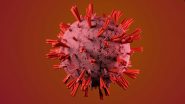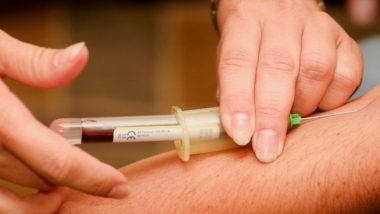New Delhi, December 5: "Unsafe injection exposure during treatment-seeking" and "receipt" of intramuscular injection in the past five years were reasons behind surge of HIV infections in Uttar Pradesh's Unnao district in 2017-18, the Indian Council of Medical Research (ICMR) said on Saturday.
The ICMR released its findings from a case-control study conducted on the sudden increase in the detection of HIV among attendees of an Integrated Counselling and Testing Centre (ICTC) located in a district hospital in Unnao in 2017. Also Read | Arunachal Pradesh: Indian Army Unveils Statues of 1962 India-China War Heroes at Walong War Memorial.
"Through the study and evidence generated, it was established that 'unsafe injection exposure during treatment-seeking' and receipt of intramuscular injection in the last five years were independently associated with HIV sero-reactive (presence of antibodies) status," the ICMR said in a statement.
The findings have helped establish that the infection arising from blood transfusion, undergoing invasive surgical procedures, tattooing, tonsuring of head or skin piercing was not related to the surge in the cases.
The ICMR said the study was done on individuals detected HIV seroreactive during November 2017-April 2018 from three locations -- Premganj, Karimuddinpur and Chakmeerapur in Bangarmau block of Unnao. The study participants were interviewed based on various risk practices and invasive treatment procedures, it said.
"They were also tested for HIV and other bio-markers reflecting unsafe injecting and sexual exposures. Along with this, secondary data analysis on three time points was performed which revealed a rising trend of HIV among attendees of specific ICTCs in the district," it said. Anil Vij Tests Positive for COVID-19, Haryana Minister Was Administered Bharat Biotech's Covaxin Vaccine in Phase-3 Trials on November 20.
Speaking about the study, the corresponding author, Samiran Panda, director of ICMR National AIDS Research Institute, Pune, said, "The study has been critical to understanding the outbreak and the challenges associated with unsafe injection practices."
"A comprehensive approach to tackle the problem should be adopted with interventions like increasing access of auto-disabled syringes and needles, empowering the local communities and implementing effective regulatory practices across care settings," Panda said.
(This is an unedited and auto-generated story from Syndicated News feed, LatestLY Staff may not have modified or edited the content body)













 Quickly
Quickly




















